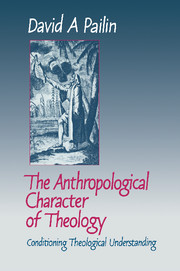Book contents
- Frontmatter
- Contents
- Preface
- 1 INTRODUCTION TO A STUDY OF THEOLOGY
- 2 FAITH, BELIEF, THEOLOGY AND REASON
- 3 GOD AS COSMIC PROJECTION
- 4 GOD AS ACTUALIZING REGULATIVE IDEAS
- 5 THEOLOGY AND RELIGIOUS EXPERIENCE
- 6 THEOLOGY AND THE APPREHENSION OF REVELATION
- 7 THEOLOGY AND HUMAN NEED
- 8 THEOLOGY AND THE COMPLETION OF UNDERSTANDING
- 9 CONCLUSION
- Notes
- Select bibliography
- Index
5 - THEOLOGY AND RELIGIOUS EXPERIENCE
Published online by Cambridge University Press: 26 August 2009
- Frontmatter
- Contents
- Preface
- 1 INTRODUCTION TO A STUDY OF THEOLOGY
- 2 FAITH, BELIEF, THEOLOGY AND REASON
- 3 GOD AS COSMIC PROJECTION
- 4 GOD AS ACTUALIZING REGULATIVE IDEAS
- 5 THEOLOGY AND RELIGIOUS EXPERIENCE
- 6 THEOLOGY AND THE APPREHENSION OF REVELATION
- 7 THEOLOGY AND HUMAN NEED
- 8 THEOLOGY AND THE COMPLETION OF UNDERSTANDING
- 9 CONCLUSION
- Notes
- Select bibliography
- Index
Summary
Although predominantly rational aspects of theological understanding have been the subject of the previous two chapters, the primary object of that understanding is not just an abstract idea or actualized ideal of ultimacy and perfection. It also – and crucially for religion – concerns what is held to be encountered in human experience. As Isaac Newton suggested, ‘God is a word expressing a relation, and it refers to servants … for we say my God, your God, the God of Israel’. More recently Martin Buber developed this kind of claim to the point of denying that God can be adequately treated as an object of thought: God is supremely the Thou ‘that may properly only be addressed, not expressed’. If, then, theism regards God as the perfect being who is apprehended in certain types or dimensions of experience, theological understanding is to be seen as partly an attempt to make sense of those forms of human experience and to draw out their implications. R. G. Collingwood, who views theology in this way, thus emphasizes that the concept of God does not refer to ‘a mere abstract unity’ but is also, perhaps in its initial state totally, derived from religious experience.
The apprehension of an experience, however, moulds its content as it finds and applies concepts to it. Even to identify certain experiences as having ‘religious’ significance, let alone to take them to be experiences of the divine, is to place them in a particular structure of interpretation.
- Type
- Chapter
- Information
- The Anthropological Character of TheologyConditioning Theological Understanding, pp. 86 - 112Publisher: Cambridge University PressPrint publication year: 1990



